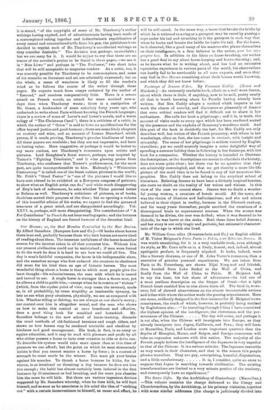Our Horses; or, the Best Muscles Controlled by the Best
Brains. By Alfred Saunders. (Sampson Low and Co.)—Of books about horses there is no end, probably because those who love horses are never tired of reading about them. The immense usefulness of the horse is another reason for the interest taken in all that concerns him. Without him our present civilisation could not be maintained ; if men were forced to do the work he does it is hard to see bow we could all live. The dog is man's faithful companion, the horse is his indispensable slave, and the nameless savage who first reduced the creature to obedience did more for his kind than an age of historic heroes. The most wonderful thing about a horse is that to which most people give the least thought—his submissiveness, the ease with which he is tamed and turned to use. A single horse is stronger than a dozen men, yet he allows a child to guide him,—except when he is restive or "vicious" (which, from the equine point of view, may mean the reverse), made so, in all probability, by crass stupidity or intolerable tyranny, he lets us see what puny creatures, physically, we are as compared with him. Whether riding or driving, we are always at our slave's mercy ; our control over him is altogether moral, and the man who shows us how to make this control at once beneficent and effective, does a good thing both for mankind and horsekind. Mr. Saunders belongs to the new school of horse.training, discards the cruel methods of old-fashioned breakers and rough riders, and shows us how horses may be rendered tractable and obedient by kindness and good management. His book, in fact, is an essay on equine education, and it may be read with pleasure and profit by all who either possess a horse or have ever occasion to ride or drive one. To describe his system would take more space than at this time of pressure we can afford ; but the point on which he most strenuously insists is that you cannot master a horse by force ; in a contest of strength he must needs be the winner. You must pit your brains against his muscles. To thrash a horse because be kicks, for in- stance, is as irrational as thrashing a dog because he does not love you enough ; the habit has almost certainly been induced in the first instance by ill-treatment or bad breaking, and the more you chastise him the more he will kick. Bat there are various ingenious devices suggested by Mr. Saunders whereby, when he does kick, he will hurt himself, and so soon as he associates in his mind the idea of "striking out" with a certain inconvenience to himself, as cause and effect, he will be self-cured. In the same way, a horse that breaks the bridle by which he is tethered to a ring or a gatepost, may be cared by passing a rope under his tail and attaching to it the gatepost in such way that when he backs and breaks the bridle he harts his tail. For the horse, be it observed, like a good many of his masters who plume themselves on their intelligence, is a firm believer in the axiom, post hoc ergo propter hoc. In addition to his hints on horse-breaking, our author has a good deal to say about horse-keeping and horse-choosing ; and, as he knows what he is writing about, and has had an extensive equestrian experience in various parts of the world, his observations can hardly fail to be serviceable to all save experts, and even they may find in Our Horses something about their horses worth knowing, and which they did not know before.


































 Previous page
Previous page